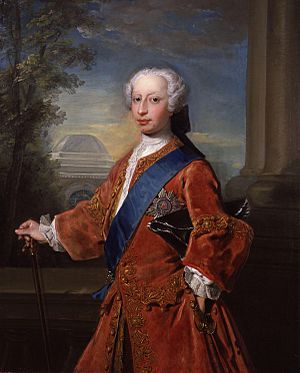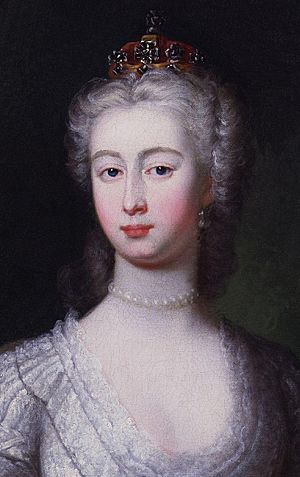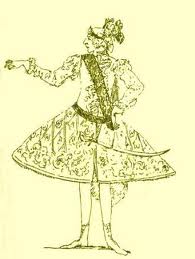Atalanta (opera) facts for kids
Atalanta (HWV 35) is a special kind of opera called a pastoral opera. It has three acts and was written by George Frideric Handel in 1736. The story is based on the mythological female athlete, Atalanta. The words for the opera, called the libretto, are in Italian and come from a book called La Caccia in Etolia by Belisario Valeriani. We don't know who wrote the libretto for Handel.
Handel created this opera for the celebrations in London. It marked the wedding of Frederick, Prince of Wales, who was the oldest son of King George II, to Princess Augusta of Saxe-Gotha. Their wedding happened in 1736. The opera was first performed on May 12, 1736, at the Covent Garden Theatre. The show ended with an amazing fireworks display, which the royal family and the audience in London loved. Because it was so popular, the opera and fireworks were performed many more times that year.
A famous song from the opera, "Care selve," is often sung in concerts and found on recordings.
Contents
About the Opera's History
Handel, who was born in Germany, first brought Italian opera to London in 1711 with his opera Rinaldo. It was a huge hit! Rinaldo made Italian opera seria very popular in London. This type of opera focused a lot on solo songs for famous singers. Handel had put on many successful new operas in London for years.
One of the big stars in Handel's operas was a singer named Senesino. He and Handel often had disagreements. Eventually, Senesino left Handel's group to join a rival opera company called the Opera of the Nobility. This new company started in 1733 and was supported by the Prince of Wales. Handel moved his operas to a different theatre, Covent Garden, and hired new singers. However, London didn't have enough audience or rich supporters for two opera houses at once. Both companies started to have money problems.
Handel's spring season in 1736 was shorter than usual, probably because of these difficulties. But when the Prince of Wales's wedding was announced, Handel quickly prepared an opera to celebrate. His rival, Nicola Porpora, also wrote a special musical piece for the wedding called La festa d'Imeneo. Neither work was ready for the wedding day itself, April 27, 1736. Porpora's piece premiered on May 4. Atalanta first showed on May 12. The King and Queen attended, but their son, the Prince of Wales, and his new wife were not there.
Atalanta was a lighter, more joyful opera than many of Handel's other serious operas. It was similar to his very popular piece Il Pastor Fido, which he had recently brought back. The royal wedding celebrations at the end of the opera, with fireworks on stage, caused a big stir! A poet named Thomas Gray wrote about it:
- In the last act, the Temple of Hymen (the god of marriage) appears with lights.
- Blue fires burn in a line up to the temple.
- A fountain of fire shoots up from the ground to the ceiling.
- Two more fire fountains cross each other from the sides of the stage.
- On top, a wheel spins and throws out gold, silver, and blue fiery rain.
Characters in the Opera
| Character | Voice Type | First Performer, May 12, 1736 |
|---|---|---|
| Atalanta | soprano | Anna Maria Strada del Pò |
| Meleagro | soprano | Gioacchino Conti, called Gizziello |
| Irene | contralto | Maria Caterina Negri |
| Aminta | tenor | John Beard |
| Nicandro | bass | Gustavus Waltz |
| Mercurio (Mercury), the messenger god | bass | Henry Theodore Reinhold |
The Story of Atalanta
The opera's story is loosely based on the old Greek myth of Atalanta. It takes place in ancient Greece.
Act 1: Hidden Identities
King Meleagro of Aetolia has dressed up as a shepherd and calls himself Tirsi. He enjoys living in the countryside, away from his kingly duties. He is deeply in love with a huntress he knows as "Amarilli." He doesn't realize she is actually Princess Atalanta. He meets Aminta, a real shepherd, who is very much in love with a shepherdess named Irene. But when Irene appears, she only makes fun of Aminta. He says he would die for her and will always be true.
Nicandro, who is Irene's father and Meleagro's friend, tells Meleagro that Irene really loves Aminta too. She just wants to be sure he will be faithful to her.
Princess Atalanta of Arcadia now enters. She has also taken a different name, Amarilli, and is disguised as a huntress in the countryside. Everyone gets ready to go hunting. Atalanta won't let Meleagro stay by her side during the hunt, even though she secretly loves him. When a wild boar runs out of the woods, Aminta tries to throw himself in its path. He is so upset by Irene's teasing. But the others stop him. Atalanta kills the boar and celebrates her victory.
Act 2: Mixed Signals
Everyone is celebrating Atalanta's success in killing the wild boar. But Atalanta herself feels sad because she is in love with "Tirsi." As a princess in disguise, she feels she cannot marry a simple shepherd. She doesn't know that "Tirsi" is actually King Meleagro, also in disguise. Meleagro overhears her thoughts and tries to tell her who he is. But both he and she are very shy, so they don't manage to clear things up.
Irene pretends to be in love with Meleagro. She is only trying to make Aminta even more upset. Meleagro gives Irene a ribbon and asks her to give it to Atalanta. He wants Irene to tell Atalanta how much he loves her.
Irene shows off the ribbon Meleagro gave her to Aminta. She pretends she is truly in love with Meleagro. Aminta complains about her unkindness. Atalanta gives Aminta an arrow. She asks him to give it to Meleagro without saying her name. Meleagro knows she really loves him and is quite happy. But Atalanta feels her royal duty will stop her from ever telling him her love.
Act 3: Truth Revealed
Irene gives Atalanta the ribbon Meleagro gave her. Atalanta is touched. She sends a message to Meleagro that he can learn everything about her through Aminta.
Irene then meets Aminta. He decides to play a trick on her by showing off the arrow Atalanta gave him for Meleagro. Aminta says Atalanta gave him the arrow because she is madly in love with him, and he loves her too. Irene becomes very angry. Meleagro, who has been secretly watching and listening, feels hopeless. Irene then admits she has been in love with Aminta all along. Meleagro, left alone and tired from all this emotional confusion, falls asleep.
Atalanta enters, thinking about the strange fact that the ribbon sent to her by the shepherd "Tirsi" looks like King Meleagro's ribbon. Meleagro wakes up. Atalanta can't hold back anymore; she admits she loves him, and they hug.
Nicandro, Irene, and Aminta enter. Irene and Aminta have sorted everything out and admit they love each other. Nicandro tells the shepherd "Tirsi" that the huntress "Amarilli" is really Princess Atalanta. He tells Atalanta that "Tirsi" is really King Meleagro. Now there is nothing to stop their marriage, and both couples are very happy.
The sky opens, and Mercury, a messenger from the god Jove, comes down on a cloud. He is surrounded by little Cupids and the Graces. Mercury brings Jove's blessings to the royal couple. He promises them personal happiness and the love of their people. The opera ends with everyone celebrating and a display of fireworks.
Music in Atalanta
The opera starts with a grand opening piece called an overture. It includes parts for two trumpets, which then don't play again until the very end. The ending of the opera is a "licenza" finale. This is a special part where the singers stop being their characters. Instead, they praise the royal people who are watching in the audience. This was a common feature in some operas, like Gluck's Orfeo ed Euridice. Even though Atalanta is generally light and happy, Handel's music also explores the sadder feelings of the characters.
The music for the opera is played by two oboes, a bassoon, two horns, three trumpets, timpani (drums), strings (like violins), and a continuo. The continuo group usually includes a cello, a lute, and a harpsichord.
Recordings
- Dominique Labelle, soprano, Susanne Rydén, soprano, Cecile van de Sant, mezzo-soprano, Michael Slattery, tenor, Philip Cutlip, baritone, Corey McKern, baritone, Philharmonia Chorale, Philharmonia Baroque Orchestra, Nicholas McGegan, conductor. Recorded 2005. Philharmonia Baroque Orchestra CD's.
- Katalin Farkas, soprano, Éva Bártfal-Barta, soprano, Éva Lax, contralto, János Bándi, tenor, Jószef Gregor, bass, László Polgár, basszus, Savaria Coral Ensemble, István Deák, Capella Savaria, Pál Németh, Nicholas McGegan, conductor. Recorded 1985, Hungaroton CD (World premiere Recording).
 | Laphonza Butler |
 | Daisy Bates |
 | Elizabeth Piper Ensley |




